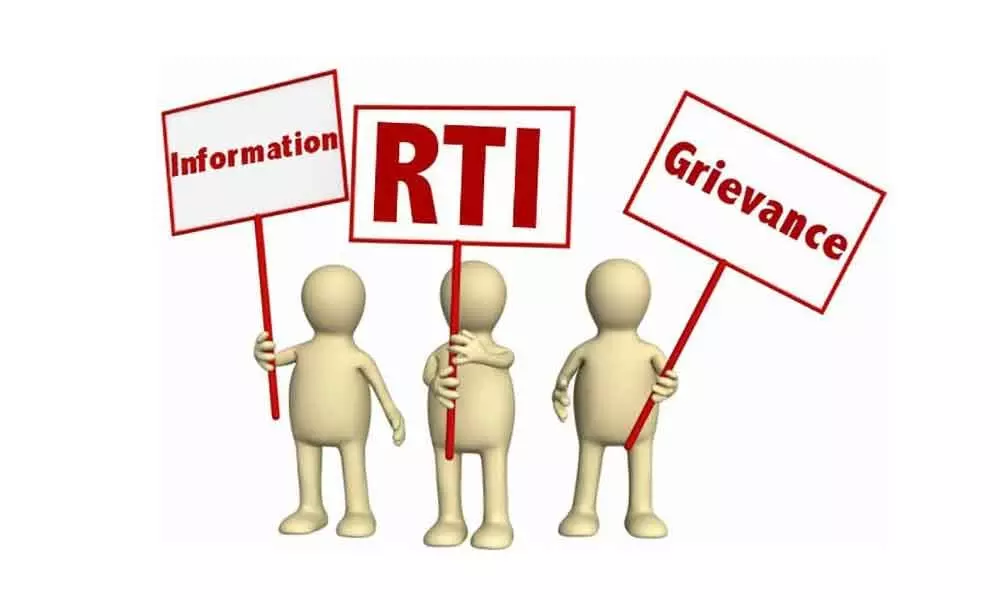RTI: High Court admonishes irresponsible PIOs

RTI: High Court admonishes irresponsible PIOs
The Supreme Court long back stated in a landmark judgment State of Uttar Pradesh v. Raj Narain and Others, "... people of this country have a right to know every public act, everything that is done in a public way by their public functionaries
The Supreme Court long back stated in a landmark judgment State of Uttar Pradesh v. Raj Narain and Others, "... people of this country have a right to know every public act, everything that is done in a public way by their public functionaries. They are entitled to know the particulars of every public transaction in all its hearing."
This principle was reiterated by Justice S Vaidyanathan, in a positive judgment for Right to information in case of Tamil Nadu Public Service Commission versus Tamil Nadu State Information Commission, on 7th September 2020. Mr. A. Muthian, a citizen filed an RTI application seeking following information:
a) Total number of vacancies called for the years 2006, 2007 and 2008;b) Number of seats allocated to the Backward Community out of the total number of vacancies called for the years 2006, 2007 and 2008;c) Number of seats allocated to the Most Backward Community out of the total number of vacancies called for the years 2006, 2007 and 2008;d) Out of seats allocated to the Backward Community, the list of the selected candidates from the sub-castes of Muthuraja and Muthriyar; e) Out of seat allocated to the Most Backward Community, the list of selected candidates from the sub-castes Ambalakarar; f) Out of seat allocated to the Most Backward Community, the list of selected candidates from Vanniya Kula Shatriar sub-castes (Vanniyar, Vanniya,VanniyaGounder, Kandar, Padayachi Palli and Agni Kular Shathriar)."
The Public Information Officer of the Tamil Nadu Public Service Commission gave the detailed information sought for in respect of (a) to (c) but denied the information for that other queries claiming exemptions under Section 8 (1)(d) of RTI Act, which pertains to commercial confidence, trade secrets or intellectual property, the disclosure of which would harm the competitive position of a third party. However, when the applicant appealed, the second appellate authority, the Tamil Nadu Information Commission (TNIC), ordered that the information sought be provided free of cost.
The TNPSC claimed that it, being a Constitutional functionary, has moral obligation to maintain confidentiality and in the event of furnishing of the details to the respondent, it would harm the interest of third parties and the details regarding caste-wise breakup of the selected candidates got nothing to do with the public activity and such disclosure would amount to invasion of the privacy of individuals, apart from creation ofcommunal discontent and strife.
It was stated that the State has stopped the sporting ofthe caste behind the names of persons and at the time of publication of result, TNPSC used to indicate only the Class of candidates and not otherwise. Therefore, the direction tofurnish such details, issued by TNIC is highly unsustainable and untenable.
The Madras High Court rejected contentions by the Tamil Nadu Public Service Commission (TNPSC) that the information sought for, if divulged, would infringe the privacy of individuals and create communal discontent and strife. The HC said: "The contention of TNPSC that the details sought for by the respondent are not at all warranted and that it would amount to invasion of privacy, cannot be accepted, especially when the selection itself is based on caste- wise quota.
The disclosure of caste wise breakup will certainly inure to the benefit of candidates to ascertain as to whether they actually fall under the reservation quota or not. When the general list itself has already been published for public view, as stated in the petition, there is nothing wrong in disclosing the details to the respondent. In the list, the details of caste, including sub-caste have to be necessarily mentioned and the contention that such revelation would create communal disharmony is not acceptable.
As long as there is a provision for appointment on the basis of reservation, what prevents the authorities in unearthing those details to the public and when the details sought for by the respondent are furnished, it will throw a clear light / picture as to under what category, a candidate was placed.
The Court further said: The apprehension of TNPSC, that in-depth description of castes will create communal unrest, is only an illusion and imaginary and if it is the real concern of TNPSC and the Government, they should think of abolishing the quota system as well as removal ofcolumn regarding caste particulars in the school certificate itself, so that the people of Tamil Nadu could stand united under one roof irrespective of caste, creed, religion, etc. atleast in the year 2050 and our State will be a model State for the whole of the country.
The Court added that the TNPSC's apprehension that an in-depth description of castes would create communal unrest is only an illusion. Justice Vaidyanathan further remarked,"... if it is the real concern of TNPSC and the Government, they should think of abolishing the quota system as well as removal of column regarding caste particulars in the school certificate itself, so that the people of Tamil Nadu could stand united under one roof irrespective of caste, creed, religion, etc. at least in the year 2050 and our State will be a model State for the whole of the country ."
The Court ultimately upheld the TNIC's findings and ordered the provision of the information sought for within a month's time, after also noting that first authority had erroneously relied on Section 8(1)(d) of the RTI act to reject the RTI request. The Court said,
"... the purpose of enactment of RTI Act itself is to ensure transparency in all respects. Moreover, a reading of the said section shows that it relates to commercial confidence, trade secrets, etc., and it does not strictly prohibit the authority concerned from providing such details, as divulging of caste details will surely be beneficial to candidates to doubly ascertain either about their induction or rejection and as such."
The Judge also directed the TNPSC to appraise the Court of the names and position of the officials who had rejected the RTI request and who had, thereby, "failed to discharge their official duties as adumbrated under the RTI Act, 2005."
The court also directed the Tamil Nadu government to issue a circular to its departments warning of legal consequences if information is not divulged in line with the RTI Act.
Justice S Vaidyanathan remarked,"Now-a-days, the Officials are used to adopt a tactic answer in mechanical manner that the information sought for is exempted in the light of Section 8(1)(d) of the Act, without actually ascertaining as to whether the information sought falls within the ambit of the said provision. Such Officers must be taught a lesson and in my view, they are unfit to hold the post of Public Information Officer or any other post in connection with the discharge of duties under RTI Act and they should be shown the doors, so that it will be a lesson for other Officers to act in accordance with the terms of the Act, failing which they may also face the similar or more consequences."
"... the provision of Section 6 confers right to information to any person for the obvious reason that right to information flows from the right to expression... Even the Supreme Court clearly held that the office of Chief Justice will come under the purview of Right to Information (RTI), by observing that transparency does not undermine judicial freedom.
"The Court has now also directed the Tamil Nadu Government to issue a circular to its Departments warning of legal consequences that would follow if information is not divulged in line with the RTI Act."The Government is directed to circular this order to all its Departments, Public Sector Undertakings, Corporation, etc., so that the Authorities, more particularly under RTI Act, will come to know of the legal consequences of non-furnishing of the details, which the affected parties / General Public seek for."
This judgment came as a relief to transparency lovers, among several anti-RTI incidents and orders in recent times.
(The writer is Dean, School of Law, Bennett University, and former Central Information Commissioner)











